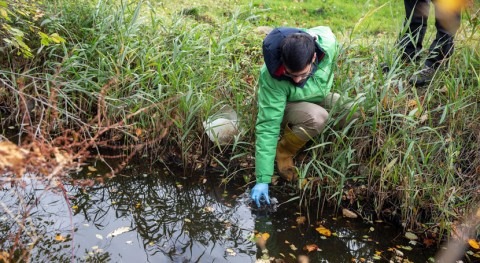The study, led by the University of Exeter, found two Vibrio species – Vibrio rotiferianus and Vibrio jasicida – that have never been recorded in UK waters before.
These species can harm sea creatures such as shellfish, but the increasing range of Vibrio species also raises concerns for human health.
Some Vibrio bacteria can cause gastroenteritis when eaten in raw or undercooked shellfish, and the bacteria can also cause skin infections.
The researchers say the spread of Vibrio species has resulted in a "worldwide surge" of Vibriosis infections in humans and aquatic animals.
"Vibrio species can often be found in UK waters in summer, when temperatures are more favourable for them," said Dr Sariqa Wagley, of the University of Exeter.
"With sea-surface temperatures rising due to climate change, Vibrio activity in the waters is more common, and the diversity of Vibrio species is now increasing."
The study used Met Office data to identify locations where summer sea-surface temperatures were favourable for Vibrio bacteria (based on average number of days per year warmer than 18°C).
Researchers then analysed shellfish samples from four sites used by the shellfish industry – Chichester Harbour, Osea Island, Whitstable Bay and Lyme Bay.
"We found Vibrio parahaemolyticus – the leading cause of seafood-borne gastroenteritis worldwide – at Chichester Harbour," Dr Wagley said.
"Vibrio alginolyticus, which can also cause illness in humans, was identified at three of the sites that had sea-surface temperatures above 18°C (Chichester Harbour, Osea Island and Whitstable Bay).
"It is important to note that thorough cooking kills harmful Vibrio bacteria in seafood.
"However, increasing abundance and diversity of Vibrio bacteria creates health risks not only for people eating seafood, but for those using the sea for recreation purposes – either due to swallowing infected seawater or from the bacteria entering exposed wounds or cuts.
"Vibrio bacteria are also a threat to a variety of marine species including shellfish themselves. Disease costs the global aquaculture industry £6 billion a year, and this burden of disease can be devastating.
"We have not seen mass mortality of shellfish due to Vibrio bacteria here in the UK yet, but this has occurred elsewhere – including in France and Australia."
Dr Wagley added: "Our findings support the hypothesis that Vibrio-associated diseases are increasing and are influenced by the rise in l sea-surface temperature.
"We need to monitor this situation closely, to protect human health, marine biodiversity and the seafood industry."
Dr Joanne Preston, from the University of Portsmouth, said: "It is important to monitor the impact of increasing sea surface temperature on potential shellfish pathogens, not just for human health and safety, but also to understand the resilience of our coastal species and habitats to climate change."
Dr Luke Helmer, from the Blue Marine Foundation and the University of Portsmouth, added: "The impacts of climate change on the marine environment are likely to be widespread.
"Understanding how these changes will affect ecologically and commercially important species and the people that rely on them will be crucial moving forward, in order to mitigate against them."
The study – funded by Biotechnology and Biological Sciences Research Council (BBSRC) – was supported by Chichester and Havant Council and Sussex Inshore Fisheries and Conservation Authority.
The paper, published in the journal Water Research, is entitled: "The increased prevalence of Vibrio species and the first reporting of Vibrio jasicida and Vibrio rotiferianus at UK shellfish sites."



















